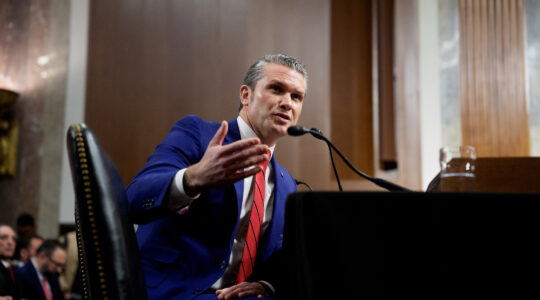TEANECK, N.J. (JTA) – In the months since the 86-year-old financial giant Bear Stearns disappeared in the midst of a financial crisis, I’ve learned five important life lessons.
Somehow, I had missed them in my 25 years on Wall Street, 20 of them with Bear Stearns.
Here is what I learned:
God runs the world.
Your prayers are answered, so think carefully about what you pray for.
Think about your legacy.
Every benefit has a cost and every cost has a benefit.
Handling tests is easier than you think.
Lesson No. 1: God runs the world
When Bear Stearns collapsed, it shocked the world. Companies that are in business for 86 years without so much as a losing quarter – except for the last one – don’t go out of business, and if they do, it doesn’t happen overnight.
We knew we were having a bad year, but we were in a cyclical business. We’d had good years and bad years. My area – equities – was having a good year, and the firm was profitable again, highlighting what we thought was the strength of our business model.
But then Bear disintegrated, and my stunned colleagues and I tried to figure out why. Was it our new CEO? Our ex-CEO? Our shorting stocks? Bad press?
Many of us went through the stages associated with the loss of a loved one – denial, anger, depression. Finally, we began to accept our situation.
I, too, went through these stages. Until the demise of Bear Stearns, I knew what my schedule was going to be, more or less, for the next year or so. I was working on projects through 2010. I was firmly in control and knew what the future would be.
Then I learned I wasn’t in control.
Bear’s collapse showed me who is really in control: God. It was all part of God’s plan. You can be angry with God’s plan, but it doesn’t change the plan.
On one level, it’s like going to a museum and becoming angry at the exhibits. It’s a silly reaction because it doesn’t change the exhibits. So you may as well enjoy the museum.
Lesson No. 2: Your prayers are answered, so think carefully about what you pray for.
As a ba’al teshuvah, or newly observant Jew, I often had thought about taking off some time to learn Torah. Though I have studied some over the years – studying Talmud daily in the daf yomi, attending synagogue classes – I still saw my Jewish knowledge as lacking depth.
I thought about taking a sabbatical, but I had two conditions: I couldn’t take off after a good year, since I needed just one more good year. And I couldn’t take off after a bad year, since I really needed a good year to take off. Outside of these two mutually exclusive conditions, I would take off time to learn.
Around last November I began talking with a rabbi in my hometown of Teaneck, where I had moved with my family three years ago, about studying at the local Yeshiva Gedolah one or two mornings a week.
But when it came down to it, I could never find the time.
God found the time for me. He cleared my entire schedule. He arranged a sabbatical year for me.
I viewed what had happened to Bear Stearns as an act of God that was outside the natural course of things, but I didn’t know why it had happened.
All I knew was that the message – whatever it was – was that something must change.
Ironically, I was offered a job at the firm that bought us. The person at J.P. Morgan who did what I did coincidentally resigned the day Bear Stearns went out of business. I could have slipped from one vine to the next with nary a glitch.
But the e-mails we get from God aren’t always so clear. That’s where prayer comes in. God does answer prayers. Sometimes the answer is murky, and sometimes it is a smack upside the head.
That’s how I ended up learning two hours a day at a yeshiva.
Lesson No. 3: Think about your legacy.
In my 25 years on Wall Street, I made people a lot of money – and may have lost people a lot of money at times as well. I was on the Institutional Investor All-Star team for 16 years and on The Wall Street Journal All-Star team for nine years.
But that is not what I will be remembered for from my years at Bear Stearns. The observant world remembers me for running the Bear Stearns minyan.
When Bear Stearns moved to a new building several years ago, tighter security regulations killed our old stairwell mincha minyan. But after a few months I was able to get the conference room next to my office. Word spread and we started attracting outsiders from nearby firms.
After a few weeks, I received a call from Bear’s human resources department. I was told there were issues with outsiders coming to a “secure” floor.
“What can we do?” I asked.
It turns out there is a law requiring companies to provide employees with reasonable accommodation to prayer. So while the company did not want an official Bear Stearns minyan, they agreed to give me a room every day for prayer – for the “Andy Neff meeting” – to which I could invite some of my friends to enable me to have a minyan. Twenty to 30 people regularly attended the service.
Ironically, though Bear Stearns is gone, the minyan lives on. Roughly one-third of the attendees were from J.P. Morgan, which owned three buildings adjacent to our headquarters. We simply transferred management of the minyan to J.P. Morgan.
Lesson No. 4: Every cost has a benefit and every benefit has a cost.
In the Ethics of the Fathers, Ben Zoma asks, Who is wise? The person who learns from everyone else. Who is strong? The person who controls himself. Who is rich? The person who is happy with what he has. Who is honored? The person who honors others.
Each of these attributes can come only from oneself. You cannot depend on others for your wisdom, strength, wealth, honor – or happiness.
Wall Street is a great place to have a career. It can bring great wealth, prestige and power. But there is also a cost. You lose track of priorities. You live with great stress.
A Talmudic passage says that in the world to come, we learn that the next world is inverted from this world. It was a hard passage for me to understand until I left the high-powered world. The things I feared losing most were small things: a secretary, car services. The things I gave up most easily – time, especially with my family – had the most value.
In retrospect, I see how inverted my priorities were on Wall Street.
Lesson No. 5: Handling tests is easier than you think.
On one level, I believe that I am fortunate to have had this test at this stage in my life.
We learn that God never gives us a test we can’t handle. To me, conversely, that says that I was not ready to handle this test until now. I’m thankful that I have matured to a level that I can handle something like this.
The loss of a career is devastating on many levels, and financial uncertainty can be a nightmare. But the positive for me is learning that I can deal with it.
It’s a new reality, but I am ready for the next reality.
(Andrew Neff worked as a senior managing director and securities analyst at Bear Stearns. This column was adapted for JTA from a speech Neff gave at the annual dinner of Yeshiva Gedolah of Teaneck on July 27, 2008, in memory of his mother-in-law, Lucy Rabin Feiden.)
JTA has documented Jewish history in real-time for over a century. Keep our journalism strong by joining us in supporting independent, award-winning reporting.





